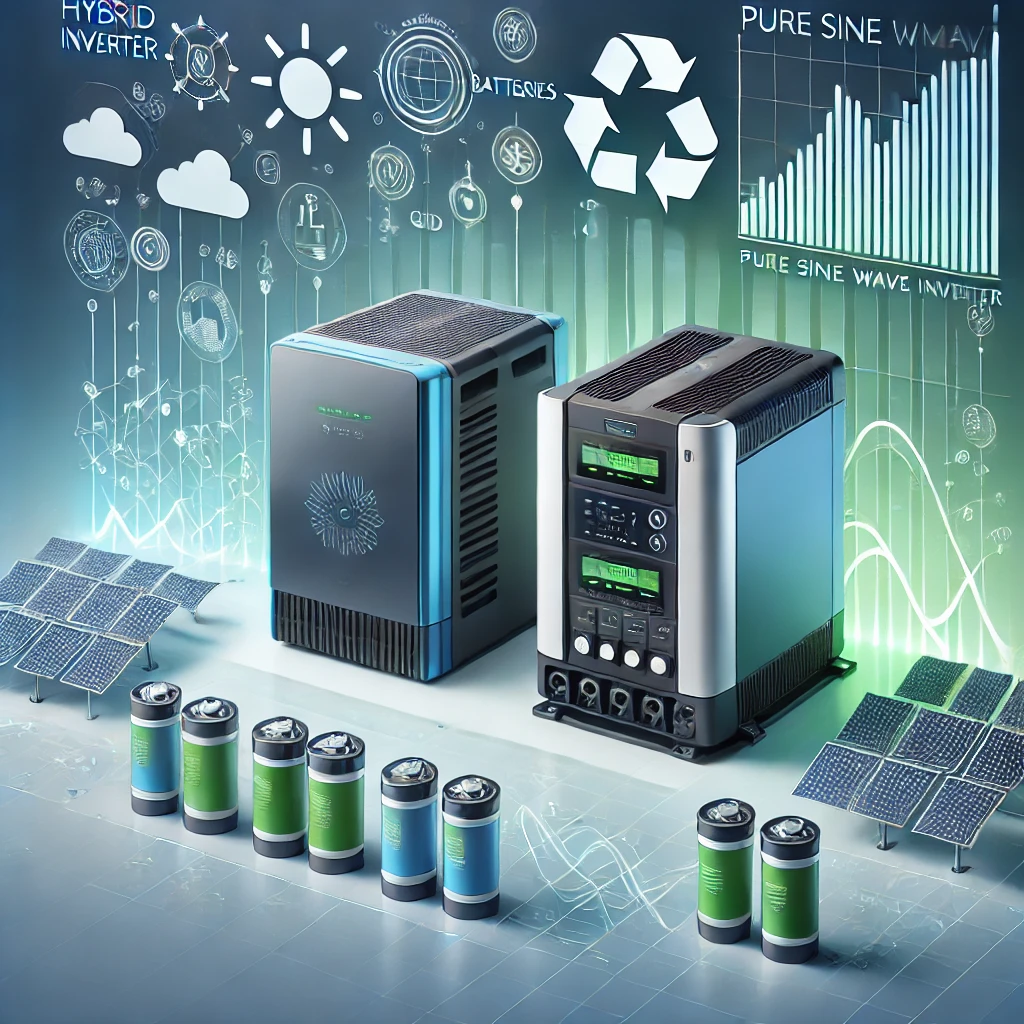zeal
De Techizard
You can't have a solar setup without an inverter, but what's more important is choosing the best inverter type for your setup. There are two major types of inverters, "Hybrids" and "Standard" inverters. These two inverter types are particularly handy in different ways and may utilize the "Pure Sine Wave" technology to ensure efficient and effective power distribution.
A pure sine wave inverter is not basically a type of inverter; instead, "pure sine wave" refers to the energy production and distribution pattern of an inverter. It's okay if you're pretty confused about this, but this article explains, in detail, the differences between what is called a hybrid inverter and a pure sine wave inverter.

A hybrid inverter receives power from multiple energy sources, which include traditional sources like grids and solar panels, and renewable sources like batteries. On the other hand, a pure sine wave inverter refers to a type of inverter that is able to output/distribute high-quality AC power, closely mimicking the smooth waveform of standard household electricity received from the traditional utility grid.
Pure sine wave can be a feature of both standard and hybrid inverters; which implies that a hybrid inverter can be a pure sine wave inverter, but not all pure sine wave inverters are hybrid inverters. Many homeowners prefer hybrid inverters that support the pure sine wave technology due to the stable power output they can achieve with such inverters.
The contrast of hybrid inverters is standard inverters, while that of pure sine wave inverters includes modified sine wave and square wave inverters. Square wave inverters are not recommended if you use sensitive electronic appliances with your solar setup.
Standard inverters are equally good, but they can only receive energy from one source (usually a traditional source like the solar panels or transformer grid). This limitation of standard inverters can be a big deal if you live in an area with an unsteady electricity supply from the national grid.
A pure sine wave inverter is not basically a type of inverter; instead, "pure sine wave" refers to the energy production and distribution pattern of an inverter. It's okay if you're pretty confused about this, but this article explains, in detail, the differences between what is called a hybrid inverter and a pure sine wave inverter.
What is a Hybrid Inverter
As the name implies, a "Hybrid Inverter" is such that receives power from multiple sources like the grid, battery, and solar panels. Hybrid inverters can work with renewable energy sources (batteries) and traditional energy sources (transformer grid and solar panels). This type of inverter can store energy for you to use at a later time. A hybrid inverter may, or may not use the pure sine wave technology. This type of inverter comprises a traditional inverter, a charge controller, and a grid-tie function - that's what makes it a hybrid.What is a Pure Sine Wave Inverter
Pure Sine Wave inverters refer to a type of inverters that utilize the pure sine wave technology, which mimics the stable power delivery pattern of transformers (grid). A pure sine wave inverter receives DC power, and converters and then outputs the DC power as clean, steady AC power similar to what the utility grid supplies, which ensures that all your connected appliances are powered efficiently. Of course, the pure sine technology can be used in a hybrid inverter or standard (non-hybrid) inverter.What's the Difference Between Hybrid Inverters and Pure Sine Wave Inverters

A hybrid inverter receives power from multiple energy sources, which include traditional sources like grids and solar panels, and renewable sources like batteries. On the other hand, a pure sine wave inverter refers to a type of inverter that is able to output/distribute high-quality AC power, closely mimicking the smooth waveform of standard household electricity received from the traditional utility grid.
Pure sine wave can be a feature of both standard and hybrid inverters; which implies that a hybrid inverter can be a pure sine wave inverter, but not all pure sine wave inverters are hybrid inverters. Many homeowners prefer hybrid inverters that support the pure sine wave technology due to the stable power output they can achieve with such inverters.
The contrast of hybrid inverters is standard inverters, while that of pure sine wave inverters includes modified sine wave and square wave inverters. Square wave inverters are not recommended if you use sensitive electronic appliances with your solar setup.
Conclusion
When in the market for a solar inverter, it is best to look out for hybrid inverters that are based on pure sine wave technology; they are a much better and more reliable option than any other type. Yeah, you can find hybrid pure sine wave inverters of various capacities, including 1.5kVA, 2kVA, 3.5kVA, 5.0kVA, 7kVA, and up to 30kVA or even higher.Standard inverters are equally good, but they can only receive energy from one source (usually a traditional source like the solar panels or transformer grid). This limitation of standard inverters can be a big deal if you live in an area with an unsteady electricity supply from the national grid.